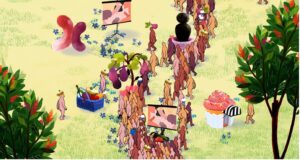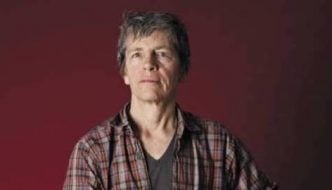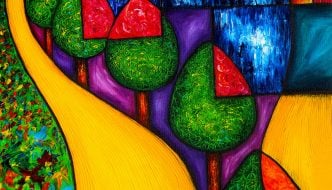
We Dwell In Possibility. Credit: Eleanor Davis and Robert Yang
Digital artist and game-maker Robert Yang has collaborated with illustrator Eleanor Davis to make a new garden-stimulation game for Manchester International Festival called We Dwell in Possibility.
If you are not familiar with Yang’s previous work, you can usually find a trail of proactive, queer virtual games in his tracks. His most popular works includes 2017’s The Tearoom, a public bathroom sex simulator, and the most recent is Hard Lads, a riff on a viral video of “British beefcakes” drinking, smoking, kissing, and hurting one another. Yang sets an exciting tone for this type of industry, planting a seed of brashness and controversy to create something that can be described as a ripple effect of discomfort for the modern world through glimpses of the reality in which we live.
Just like a regular garden, the game is entirely its own. You are met initially with what seems like a calm, growing garden. Then suddenly, with a click or a touch of the screen, you are then able to pick up a multitude of stimulating objects that range from butt plugs to ejaculating plants. This is, for some people, the garden of dreams.
It then leads the player to wonder, what exactly is the point of this garden? In reality, Yang’s garden is more than just a garden, but rather a public park. And Yang’s metaphor can also be seen as a tiny, naked microcosm of society. The player makes the decision on what it will look like, and this alone is what makes it the most exciting.

We Dwell In Possibility. Credit: Eleanor Davis and Robert Yang
When looking at the game from an aesthetic level, it generates an energy which is not dissimilar from a real life garden: birds chirping, bees buzzing. Instead, the people in this game are the wildlife, jostling about almost chaotically yet still not without purpose. The game time is roughly ten minutes in total, and the dynamics of the game act in a crescendo as the game continues. Both the interactions and visuals are beautifully complimented by Andy Grier’s music and sound design that leaves the player with an experience unlike any other. It is not just a videogame, but a stylized piece of artwork.
What generates this game forward is the interplay between the people and the props that they provide. Together, they form an ecosystem. Despite some of the more playful objects that can be selected, there are other props that might be recognised for a non-miscellaneous purpose, like the statue of former Conservative PM Winston Churchill. The people in your garden then become influenced by these objects, and can create their own politics from such. Again, this is tactful of Yang whereby as the ‘God’ of this garden, the player can almost watch the world unfold in front of them, and choose when they would like to intervene.

We Dwell In Possibility. Credit: Eleanor Davis and Robert Yang
It is also worth noting that should you wish, you don’t have to control anything within the game. You can watch the garden evolve naturally. This can be difficult when the population starts to multiply quickly; it can be useful to cast even the slightest influence to maintain some level of peace within your world.
The beauty of We Dwell in Possibility lies in how your world can end up. Unlike your typical online game, there are no “winners” or “losers”, and this should not deter you from playing. Instead, it is about coming to the realisation that your garden at some points might be peaceful, with welcoming and polite people passing through. And at other times, it can be a space where hedonism rears its unwelcoming head.
If you don’t create the world you want within your first play, play again until you do. The possibilities of what can happen in this game are truly endless.
You can play We Dwell In Possibility for yourself here.
Check out the MIF programme of current online events here.
Filed under: Film, TV & Tech
Tagged with: arts festival, Gaming, interactive, LGBTQ, Manchester International Festival, MIF, queer, queer art, robert yang, simulation, technology, videogame



Comments